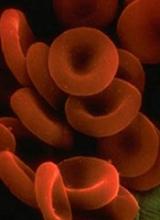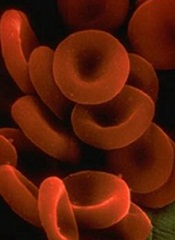User login
The US Food and Drug Administration (FDA) has granted breakthrough therapy designation to valoctocogene roxaparvovec (formerly BMN 270) for the treatment of patients with hemophilia A.
Valoctocogene roxaparvovec is a recombinant adeno-associated virus vector coding for human coagulation factor VIII (FVIII).
The breakthrough designation is intended to expedite the development and review of valoctocogene roxaparvovec.
The designation entitles BioMarin Pharmaceutical Inc., the company developing valoctocogene roxaparvovec, to more intensive FDA guidance on an efficient and accelerated development program, as well as eligibility for other actions to expedite FDA review, such as rolling submission and priority review.
To earn breakthrough designation from the FDA, a treatment must show encouraging early clinical results demonstrating substantial improvement over available therapies with regard to a clinically significant endpoint, or it must fulfill an unmet need.
The FDA granted breakthrough designation to valoctocogene roxaparvovec based on data from an ongoing phase 1/2 trial. Results from this study were presented at the ISTH 2017 Congress.
The data suggest that valoctocogene roxaparvovec can allow patients with severe hemophilia A to maintain normal FVIII levels for over a year.
The highest dose of valoctocogene roxaparvovec, 6e13 vg/kg, reduced patients’ mean annual FVIII infusions by 94% and their mean annualized bleed rate by 97%, when compared to FVIII prophylaxis.
None of the patients in this study developed FVIII inhibitors. The most common adverse event was alanine aminotransferase (ALT) elevations.
In fact, the increase in ALT levels exceeded a pre-specified threshold, which resulted in the study being placed on hold last year. However, the hold was ultimately lifted. And all patients with ALT increases have either stopped receiving corticosteroids or are being tapered off of them.
BioMarin said it expects to initiate enrollment of a global phase 3 program for valoctocogene roxaparvovec before the end of this year.
The program includes 2 studies of valoctocogene roxaparvovec, one with a 4e13 vg/kg dose and one with a 6e13 vg/kg dose. The studies will each likely include approximately 40 patients.
Valoctocogene roxaparvovec also has orphan designation from the FDA. ![]()
The US Food and Drug Administration (FDA) has granted breakthrough therapy designation to valoctocogene roxaparvovec (formerly BMN 270) for the treatment of patients with hemophilia A.
Valoctocogene roxaparvovec is a recombinant adeno-associated virus vector coding for human coagulation factor VIII (FVIII).
The breakthrough designation is intended to expedite the development and review of valoctocogene roxaparvovec.
The designation entitles BioMarin Pharmaceutical Inc., the company developing valoctocogene roxaparvovec, to more intensive FDA guidance on an efficient and accelerated development program, as well as eligibility for other actions to expedite FDA review, such as rolling submission and priority review.
To earn breakthrough designation from the FDA, a treatment must show encouraging early clinical results demonstrating substantial improvement over available therapies with regard to a clinically significant endpoint, or it must fulfill an unmet need.
The FDA granted breakthrough designation to valoctocogene roxaparvovec based on data from an ongoing phase 1/2 trial. Results from this study were presented at the ISTH 2017 Congress.
The data suggest that valoctocogene roxaparvovec can allow patients with severe hemophilia A to maintain normal FVIII levels for over a year.
The highest dose of valoctocogene roxaparvovec, 6e13 vg/kg, reduced patients’ mean annual FVIII infusions by 94% and their mean annualized bleed rate by 97%, when compared to FVIII prophylaxis.
None of the patients in this study developed FVIII inhibitors. The most common adverse event was alanine aminotransferase (ALT) elevations.
In fact, the increase in ALT levels exceeded a pre-specified threshold, which resulted in the study being placed on hold last year. However, the hold was ultimately lifted. And all patients with ALT increases have either stopped receiving corticosteroids or are being tapered off of them.
BioMarin said it expects to initiate enrollment of a global phase 3 program for valoctocogene roxaparvovec before the end of this year.
The program includes 2 studies of valoctocogene roxaparvovec, one with a 4e13 vg/kg dose and one with a 6e13 vg/kg dose. The studies will each likely include approximately 40 patients.
Valoctocogene roxaparvovec also has orphan designation from the FDA. ![]()
The US Food and Drug Administration (FDA) has granted breakthrough therapy designation to valoctocogene roxaparvovec (formerly BMN 270) for the treatment of patients with hemophilia A.
Valoctocogene roxaparvovec is a recombinant adeno-associated virus vector coding for human coagulation factor VIII (FVIII).
The breakthrough designation is intended to expedite the development and review of valoctocogene roxaparvovec.
The designation entitles BioMarin Pharmaceutical Inc., the company developing valoctocogene roxaparvovec, to more intensive FDA guidance on an efficient and accelerated development program, as well as eligibility for other actions to expedite FDA review, such as rolling submission and priority review.
To earn breakthrough designation from the FDA, a treatment must show encouraging early clinical results demonstrating substantial improvement over available therapies with regard to a clinically significant endpoint, or it must fulfill an unmet need.
The FDA granted breakthrough designation to valoctocogene roxaparvovec based on data from an ongoing phase 1/2 trial. Results from this study were presented at the ISTH 2017 Congress.
The data suggest that valoctocogene roxaparvovec can allow patients with severe hemophilia A to maintain normal FVIII levels for over a year.
The highest dose of valoctocogene roxaparvovec, 6e13 vg/kg, reduced patients’ mean annual FVIII infusions by 94% and their mean annualized bleed rate by 97%, when compared to FVIII prophylaxis.
None of the patients in this study developed FVIII inhibitors. The most common adverse event was alanine aminotransferase (ALT) elevations.
In fact, the increase in ALT levels exceeded a pre-specified threshold, which resulted in the study being placed on hold last year. However, the hold was ultimately lifted. And all patients with ALT increases have either stopped receiving corticosteroids or are being tapered off of them.
BioMarin said it expects to initiate enrollment of a global phase 3 program for valoctocogene roxaparvovec before the end of this year.
The program includes 2 studies of valoctocogene roxaparvovec, one with a 4e13 vg/kg dose and one with a 6e13 vg/kg dose. The studies will each likely include approximately 40 patients.
Valoctocogene roxaparvovec also has orphan designation from the FDA. ![]()

